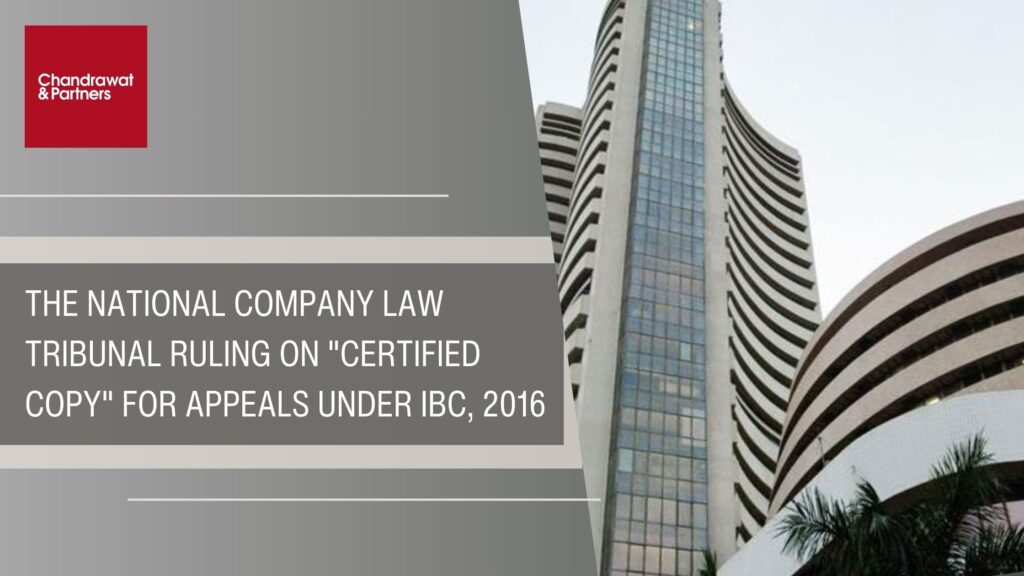
CASE BACKGROUND
The National Company Law Appellate Tribunal (the “NCLAT”) addressed the critical question in the case of State Bank of India V. India Power Corporation Ltd. (2024) on what constitutes a “Certified Copy” for the purpose of filing an appeal under Section 61 of the Insolvency and Bankruptcy Code, 2016 (“IBC”). This issue arose due to conflicting opinions among the tribunal members on whether a free copy provided under Rule 50 of the NCLT Rules, 2016 (the “NCLT rules”) opinion which are as follows:
- The Judicial Member asserted that a free copy provided under Rule 50 of the NCLT Rules does not qualify as a “Certified Copy” under Rule 22(2) of the NCLAT Rules, 2016 (the “NCLAT”) and Section 76 of the Indian Evidence Act. The free copy is seen as merely an intimation of the judgment, not fulfilling the requirement of being obtained on demand and payment of the requisite fee.
- Conversely, the Technical Member argued that the free copy provided under Rule 50 of the NCLT Rules should be considered equivalent to a certified copy for the purposes of filing an appeal under Section 61 of the IBC. This member believed that for procedural convenience, the free copy should be read at par with the certified copy as per Section 76 of the Indian Evidence Act.
The third member’s decision was different from that of the above two members:
Rule 22 of the NCLAT Rules outlines the procedure for filing an appeal with NCLAT. According to sub-rule 2 of Rule 22, every appeal must include a “Certified Copy” of the order being challenged. This rule specifies the required format for presenting an appeal to the Tribunal.
The term Certified Copy is not defined in the NCLAT Rules but is defined in the NCLT Rules. According to these rules, a Certified Copy must meet the standards set out in Section 76 of the Indian Evidence Act, which describes a Certified Copy of a public document as one issued upon request and payment of a legal fee. Therefore, two conditions must be met for a document to be considered a Certified Copy:
- There must be a request (demand) for it.
- A requisite fee must be paid.
The NCLAT Rules, framed under Section 469 of the Companies Act, 2013 require that appeals to the Appellate Tribunal be based on a Certified Copy. This requirement aligns with Rule 22 (2) of the NCLAT Rules and Rule 2(9) of the NCLT Rules, along with Section 76 of the Indian Evidence Act.
Rule 50 of the NCLT Rules, mandates the Registry to send a final order to the parties free of charge, and it also states that a Certified Copy can be obtained at a cost as per the Schedule of Fees. This implies that a free copy provided under Rule 50 is not the same as a paid Certified Copy.
ISSUES INVOLVED
The issue of whether a free copy provided under Rule 50 can substitute for a Certified Copy required for an appeal was addressed in the case of Munagala Roja Harsha Vardhini v. Vardhansmart Pvt. Ltd. The Tribunal ruled that for filing a company appeal, a Certified Copy, as defined by Section 76 of the Evidence Act and Rule 2(9) of the NCLT Rules, is mandatory. Thus, a free copy cannot be used as a substitute. This opinion was confirmed in the judgment of V. Nagarajan v. SKS Ispat, that a downloaded free copy from the website does not qualify as a Certified copy.
It was further opined by the member, if the makes of Indian Evidence Act wanted to include free copy while drafting of Section 76 than “A certified free copy” could have been used by them. Thus, a Certified Copy must be obtained by making a demand and paying the requisite fee, and the concept of a free certified copy is not valid under this context.
JUDGEMENT
On the basis of the doctrine of Binding Precedent, copies cannot substitute certified copies for legal proceedings, that certified copies must be obtained through the proper certification process as outlined in Section 76 and other relevant rules.
In order to resolve this disagreement between the Bench regarding the interpretation of the term “Certified Copy” an appeal was referred to the Hon’ble Chairman. In the Munagala Roja Harsha Vardhini case, it was established that certified copies must be provided upon demand and payment of fees rather not freely. Further the case of M/s. Whitehand Services v. M/s. RD Buildtech & Developers Karnataka Pvt. Ltd. reiterated the necessity of filing certified copies for legal appeals, in line with the Vardhini case.
It can be observed that, the free copy provided under Rule 50 of the NCLT Rules cannot be used as a substitute for the certified copy required under Rule 22(2) of the NCLAT Rules, 2016, for filing an appeal under Section 61 of the IBC. An application for a certified copy on demand and upon payment of the requisite fee is mandatory.
For more information or queries, please email us at
enquiries@chandrawatpartners.com



